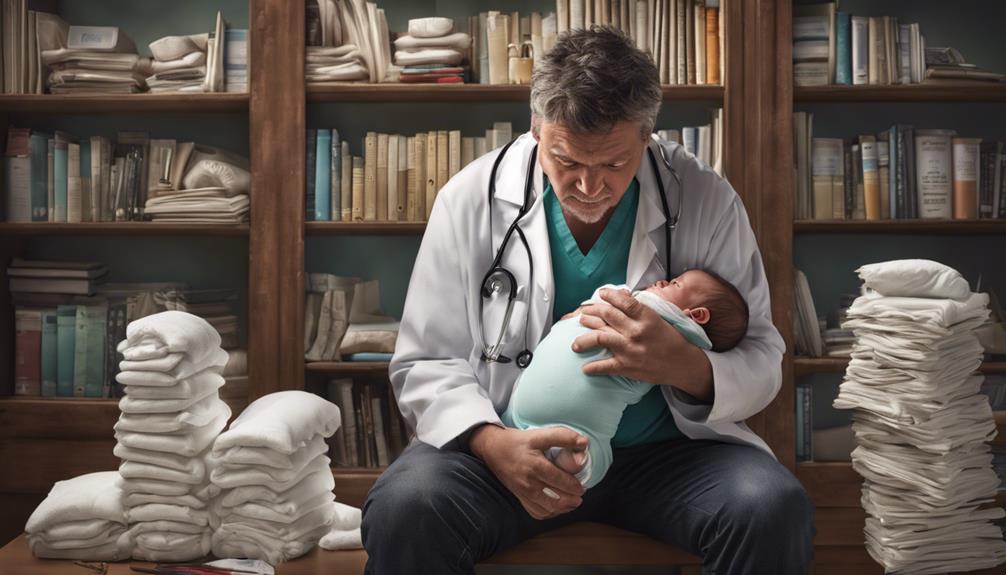When I had a bad cold, taking care of my newborn became a challenging task that required careful planning and consideration.
Ensuring the well-being of a baby while feeling under the weather can be overwhelming, but there are practical strategies that can help navigate this situation with diligence and care.
From maintaining a hygienic environment to involving support systems, the journey of caring for a newborn when the primary caregiver is unwell is multifaceted.
Join us as we explore practical tips and essential advice to navigate this delicate balance of caregiving.
Key Takeaways
- Maintain impeccable hand hygiene to protect the baby from illness.
- Minimize direct physical contact to prevent transmission of germs.
- Seek healthcare support if unable to care for yourself or the newborn.
- Delegate childcare tasks to trusted individuals for effective support.
Hand Hygiene for Newborn Care
When caring for a newborn, remember that washing our hands for 20 seconds with soap and water, as recommended by the CDC, is a simple yet essential step in keeping them healthy.
Babies have delicate immune systems, making hand hygiene critical to prevent the spread of illness and infection. The friction created by rubbing our hands together helps remove germs, ensuring that when we hold our precious little one, we're doing so with clean hands.
It's not just about washing, but also about drying our hands thoroughly, as germs transfer more easily when hands are wet. Before feeding them or handling their toys, ensuring our hands are clean is a loving gesture of protection.
Minimizing Baby Contact When Ill

To safeguard your newborn's health when you're unwell, minimizing direct physical contact is important in preventing the spread of illness. While it may be challenging, seeking support from your partner or a helper can allow you to focus on resting and recovering while ensuring your baby's well-being.
Wearing a mask and practicing good hand hygiene are essential steps to reduce the risk of transmitting germs to your little one. If direct nursing becomes difficult, consider pumping breast milk to continue providing essential antibodies to keep your baby healthy.
It's also wise to consult your healthcare provider for guidance on limiting contact with your baby and to seek medical advice on how to best care for your baby when you're unwell. Remember, your baby's health is the most important thing, so taking these precautions and following the advice of your health visitor can help protect them from common illnesses.
Cleaning Tips for a Sick Mom
During a time of illness, keeping the home environment clean and disinfected is essential for safeguarding the health of everyone, especially a sick mom and her newborn. Here are some cleaning tips to help manage the situation:
- Disinfect frequently touched surfaces: Regularly clean and disinfect surfaces like doorknobs, light switches, and countertops to prevent the spread of germs.
- Utilize appropriate cleaning agents: Use a household disinfectant or a mixture of bleach and water to ensure thorough cleaning during the medical condition.
- Focus on high-risk areas: Pay special attention to cleaning areas where respiratory droplets may land, such as bathroom surfaces and bedside tables, to minimize the risk of contamination.
- Practice proper laundry care: Wash bedding, towels, and clothing in hot water to kill germs and prevent recontamination. Consider using disposable cleaning wipes for quick and effective sanitation during sickness. Remember, a clean environment is important for the well-being of both mom and baby.
Seeking Healthcare Support for Mom

If your illness is impacting your ability to care for yourself or your newborn, reaching out to your healthcare provider is essential for ensuring both your well-being and your baby's safety. Seeking healthcare support becomes critical in receiving appropriate medical care tailored to your condition and managing your illness effectively.
Understanding your medical diagnosis is key to addressing any severe viruses promptly to minimize the risk to your baby. By communicating openly with your doctor, you can receive guidance on minimizing contact with your newborn and reducing the risk of germ transmission.
Prioritizing your baby's well-being means following your healthcare provider's recommendations diligently to minimize germ exposure and seek the necessary support for your recovery. Remember, seeking healthcare support not only benefits you but also ensures a healthier environment for your little one.
Asking for Help in Childcare
When feeling under the weather, reaching out to your support network for help in caring for your newborn can provide much-needed relief and assistance. Here are some tips for asking for help in childcare:
- Communicate Clearly: Be open about your needs with family, friends, or a postpartum doula to make sure they can support you effectively.
- Delegate Tasks: Allow trusted individuals to assist with specific baby care tasks like feeding, changing diapers, or comforting the baby, so you can focus on resting and recovering.
- Utilize Resources: Explore online platforms and virtual support groups to connect with other parents facing similar challenges and gather advice on managing childcare while unwell.
- Prioritize Rest: Delegate responsibilities and tasks to your support network to manage childcare effectively, enabling you to recuperate and regain your strength during this time.
Frequently Asked Questions
Can I Still Take Care of My Newborn if I'm Sick?
Yes, we can still care for our newborn if we're sick. By practicing good hygiene, minimizing physical contact, wearing a mask, and seeking support, we can protect our baby while focusing on recovery.
Can I Be Around My Newborn if I Have a Cold?
We can be around our newborn if we have a cold by following hygiene practices like washing hands, wearing masks, and limiting close contact. Breastfeeding is still recommended for antibodies. If needed, consider pumping milk.
Should You Stay Away From Your Baby if You Are Sick?
We believe it's important to prioritize your baby's health by minimizing contact if you're sick. Consult your healthcare provider for guidance and consider precautions like handwashing, wearing a mask, and having a helper care for the baby while you recover.
Can Someone Sick Be Around a Newborn?
We acknowledge the concern about sick individuals being around newborns. It's essential to prioritize the baby's health by avoiding close contact with sick individuals to reduce the risk of illness transmission. Simple precautions can make a big difference.
Conclusion
As we navigate the challenges of caring for a newborn while unwell, let's remember that we're the strong roots that anchor our little one in the storm.
Just like a tree bends but doesn't break in the wind, we can adapt and grow through this difficult time.
Our love and care will continue to nourish and protect our precious baby, ensuring they thrive despite the temporary setbacks.
Trust in our resilience and the bond we share with our little one.








